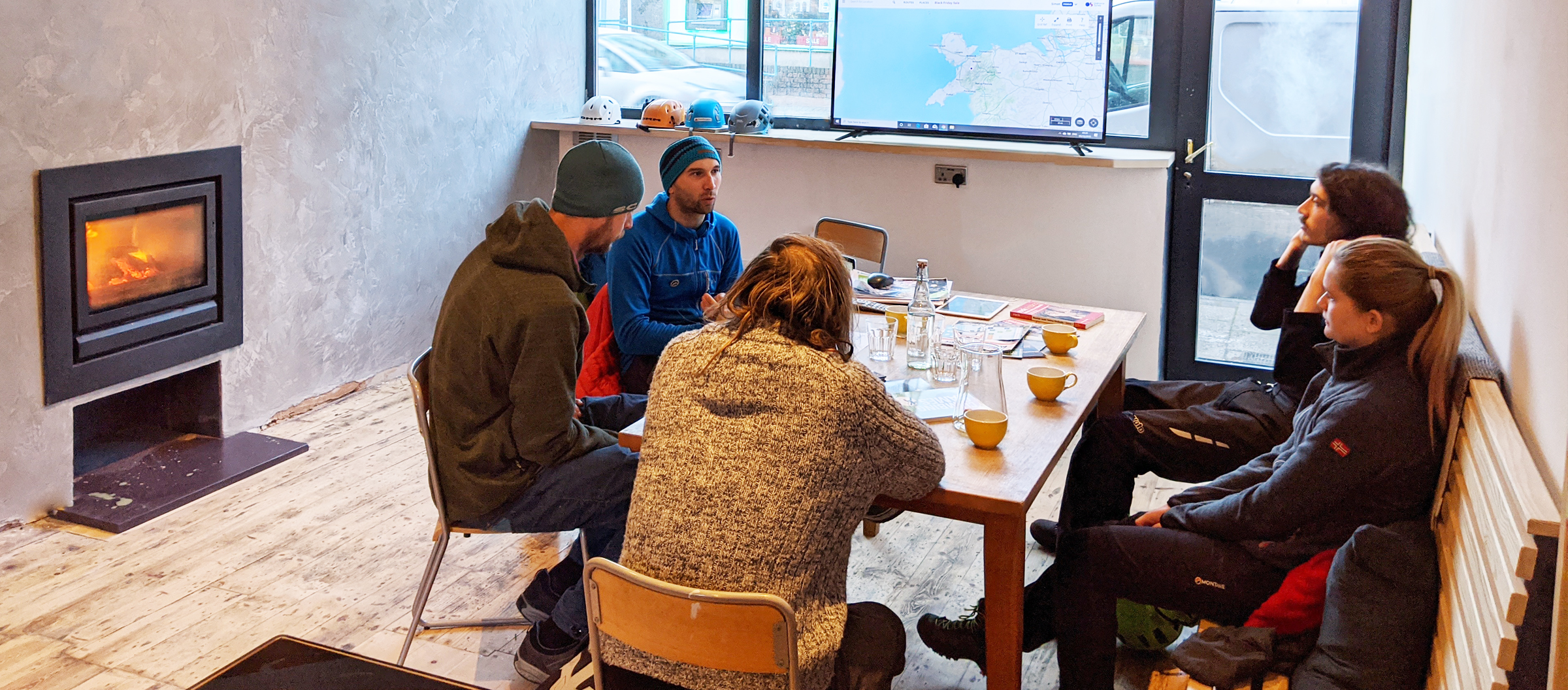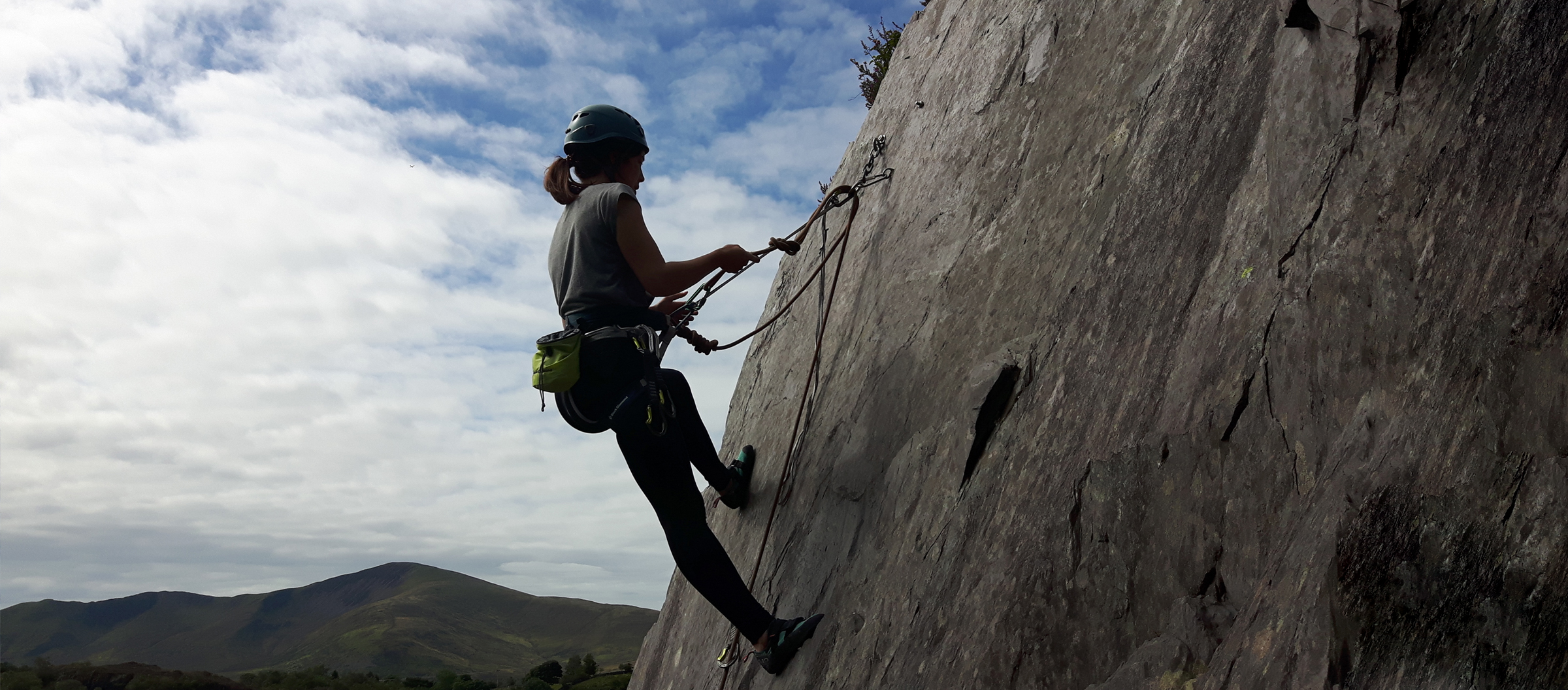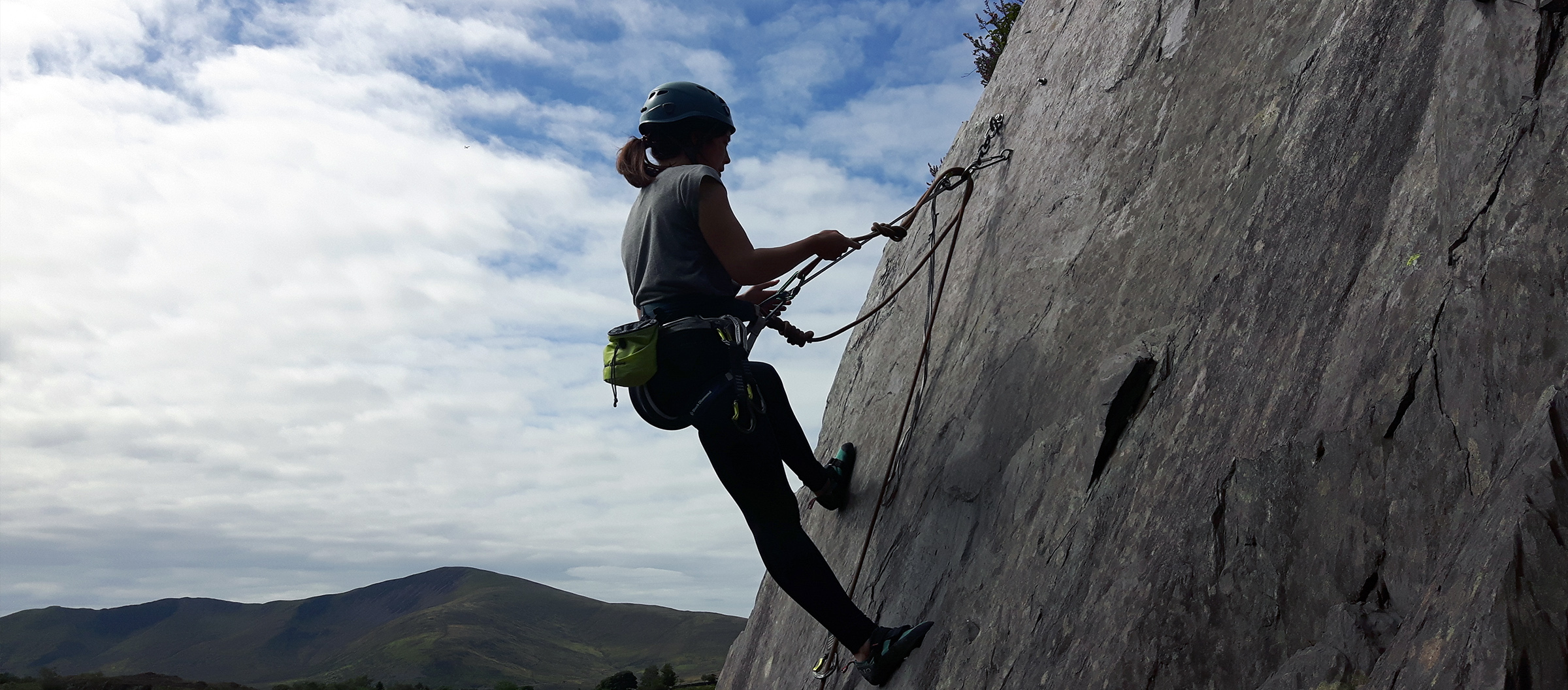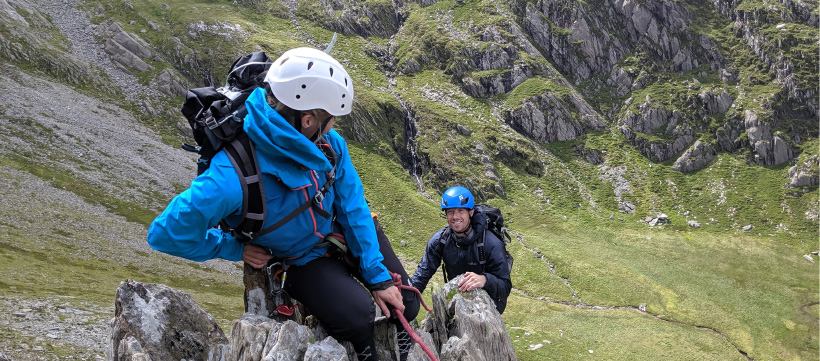Overview
The Rock Climbing Instructor qualification (the qualification formerly know as Single Pitch Award) is all about supervising safe climbing and abseil sessions on single pitch crags and indoor walls. Whether you’re a parent, a volunteer or an outdoor instructor, the Rock Climbing Instructor qualification trains and assesses rock climbers to instruct climbing.
In addition to our experience of delivering Rock Climbing Instructor award scheme, we are active and current Rock Climbing Instructors teaching actual sessions with various groups.
Syllabus
The Rock Climbing Instructor Assessment covers the following main syllabus areas:
- Technical competence – including equipment, anchors, rigging, belaying, abseiling, personal climbing skills, background knowledge of rock climbing.
- Management and Decision Making – including planning, organising, managing other staff, managing participants, knowledge and demonstration of techniques.
- Teaching skills – including technical skills such as fitting kit, tying in, belaying.
- The Climbing Environment – including access, conservation, etiquitte and ethics.
Gallery
Course Details
Before booking, you should ensure you meet the prerequisites set out by Mountain Training;
- You must have attended an RCI (or Single Pitch Award) training course (or been granted exemption).
- You must be familiar with the syllabus. (see RCI Scheme Handbook).
- You must be competently leading Severe grade climbs on outdoor crags with leader-placed protection.
- You must have led a minimum of 40 graded rock climbs with traditional protection at a variety of venues
- (of which at least 20 MUST be Severe grade or above).
- You must be proficient in using climbing walls & have a minimum of 30 indoor leads graded F4 or above.
- You must be proficient in outdoor sport climbing & have a min of 10 sport climb leads graded at F4 or above.
- You must have assisted in the supervision of 20 instructed sessions. These sessions should be at a variety of different venues with 10 being on indoor climbing walls and the other 10 on outdoor crags.
- At least five of the above sessions must have personal reflective comments recorded on DLOG.
- You must have physically attended and completed (i.e. not online) a first aid course which involved at least two full days or sixteen hours of instruction and included an element of assessment
The itinerary below isn't set in stone; by design we're flexible to adapt to the weather. Having our own base to run presentations and home-paper sessions allows us to move these sessions around in the day to take advantage of drier spells. Below is a rough plan for the course:
Day1
Intro and Indoor Wall

- Course Start - we'll meet at Basecamp at 08:30 for introductions, discussion of your experience, aims & aspirations over tea & coffee.
- Assessment Process - course outline, check First Aid Certificates and logbooks.
- Collect & Check Kit - technical equipment handed out (e.g. rigging ropes).
- Travel to Crag - we’ll organise lift-shares to reduce impact and ease parking. There’s a great deal of climbing nearby; though we may drive up to 30 mins to escape rainy forecasts.
- Outdoor Personal Climbing - ease in to assessment with a personal lead climb.
- Travel to Wall - we’ll organise lift-shares to reduce impact. There are a couple of great climbing walls nearby.
- Climbing Wall - indoor wall session, typically the Beacon Climbing Centre as it’s a great facility. Session planning, use of the wall, warm-ups, basic coaching, instructing technical skills such as tying in and belaying, problem avoidance and problem solving.
- Return to Basecamp - return to Basecamp for around 16:00, grab a well-earned brew and review the day.
- Home Paper Discussion - group discussion looking through the home papers.
Day 2
Rigging and Problem Solving

- Morning Session - we'll meet in Basecamp at 08:30 and discuss weather, planning a day, group paperwork and legislation with tea & coffee.
- Rigging Group Setups - demonstration of rigging setups, personal safety, using the systems and instructing technical climbing skills.
- Group Management - group briefings, problem prevention and solving.
- Return to Basecamp - return to Basecamp for around 15:30, hand in kit, grab a well-earned brew.
- Individual Debriefs - assessment results, feedback and advice.
- What Next? - we’ll discuss individual Action Plans for deferrals. As a group we’ll discuss working as a Rock Climbing Instructor with advice and top tips.
- Course Finish - usually we’ll wrap up the course by around 16:30.
FAQs
General FAQs
For more generalised questions please visit our FAQs page or for questions specifically relating to the Rock Climbing Instructor Assessment course see below.
Rock Climbing Instructor Assessment FAQs
The geography of Snowdonia means that although the mountains themselves can attract their fair share of rain; we have a range of crags outside the national park with unique & differing micro climates. Often, travelling up to 30 minutes North or South can mean climbing in a t shirt vs getting a good soaking!
As part of the syllabus we must spend at least 8 hours in a climbing wall, which we'll do on the worst weather day. We have 2 great local climbing walls close by, the Beacon Climbing Centre and the Indy Climbing Wall.
We'll use our specialist local knowledge and years of experience to pick the best place to climb and stay as dry as possible. We're fortunate to have our own indoor space to run presentations and theory sessions from; allowing us greater flexibility to move evening sessions to earlier in the day and head outside on an improving forecast.
Mountain Training specify that candidates must be at least 18 years old to register for this award so you will be hard pressed to have done your training yet!
As a suggestion if you're not quite that age and looking to work in the outdoors and gain a qualification, the Climbing Wall Instructor registration age is 17 years.
If you're set on working towards becoming an instructor we can organise bespoke training to help you develop.
If you completed the SPA Training rather than a Rock Climbing Instructor Course, I'd highly recommend reading through our blog post Rock Climbing Instructor - the New Single Pitch Award which will give you a run down of a few small changes beyond just the name.
It's essentially the same award, but there have been a few updates and enhancements to the syllabus area which you will need to be aware of.
If you're only a little short, and are planning on gaining some more experience prior to the assessment we will be happy to take a booking if you can outline a plan to have the required experience by the start of the course. Having said that we would highly recommend waiting until you have all the prerequisites as they are bare minimums!
Mountain Training set their prerequisites for good reason, having a good base of experience and understanding on which to build the knowledge and skills is vital. Research has shown that candidates who arrive at Assessment courses with less experience are more likely to defer or fail assessment than candidates who have a greater depth of personal experience.
It is your responsibility to hold the necessary prerequisites by assessment, neglecting to do so will result in a technical deferral as a minimum. We want you to arrive at assessment feeling prepared and confident so you can enjoy the process and gain the successful result you want!
If you've done all the prerequisites but you still feel you're not quite ready for assessment, then consider booking on to one of our refresher courses or get some private coaching. Get in Touch.

